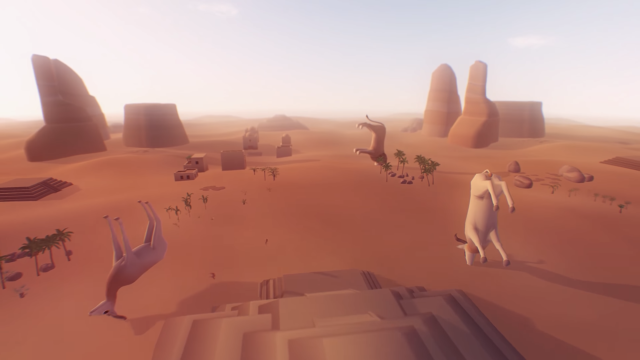An interesting way to explore a new philosophy; clever mechanics that reinforce that philosophy; frequently charming and humorous
Too abstract and non-traditional for some
With the advent of the “walking simulator,” some people have been more eager to debate what truly constitutes a video game, often arguing that merely wandering through a world with minimum focused gameplay lacks the interactivity needed for the label. Those same questions could perhaps be asked of Everything, which is, more or less, sort of an everything simulator. While I’m personally happy to describe something as a video game under almost any criteria, that doesn’t make games like Everything any easier to review!
In Everything, you start as a donkey wandering around a simple environment doing quite possibly the single most video game thing ever: following an objective marker. Doing so leads to a number of discussions with trees, rocks, and other various objects that vary from philosophical ruminations to instructions for new gameplay mechanics. While there are a fair number of ways to interact with the world, such as dancing with similar animals, the core is really the ability to jump into other creatures and objects and take control of them. At first this means possessing similar sized things, but you quickly get the ability to go into objects much smaller or larger, and this is where things get interesting.
Maybe you jump from your donkey into a fully playable flower, and then into a blade of grass, and then into an ant, and then into a microscopic organism, and then into a single atom. Or maybe you want to go the other way and you progress into a tree, a giant rock, an entire continent, the whole planet, a star, and then to a whole galaxy. I should mention these aren’t even the limits of the game’s incredible sense of scale as your perspective of the world convincingly warps to reflect the extreme variances in size. You can even hop from one planet to another, and start shrinking back down to explore the flora, fauna, and individual elements found on that planet. Putting this process into words can’t fully capture the experience of seeing it happen for yourself.

Regardless of what size you are, though, the basic objective, if you can call it that, remains the same; you’ll follow markers leading you to more brief conversations with other animals, microbes, planets, and galaxies, who have something to say about their state of being. Occasionally, you’ll spot a different objective marker which leads you to audio recordings of philosopher Alan Watts as he discusses the interconnected nature of all things in the universe. These lecture snippets really feel like the most significant clue to the overall point of the game and judging from the way things progress, I’d say the developers get their point across quite well. I don’t want to spoil anything, though, because there is a narrative of sorts that opens up as you interact with more of the universe and it legitimately does go someplace rather interesting. I don’t know if I’d call it a narrative, but thematically there is a payoff for following the game’s “objectives.”
Considering this, Everything is really best described as an incredibly chill and interesting experience. The music is pleasant and Alan Watt’s voice can be quite hypnotic as you shrink and expand throughout the many layers of existence. The game just compels you to continue exploring, if not just to see what other strange objects you can possess as well as to read the quirky existential insights they have to offer. It also helps that you eventually unlock the ability to change into any previously possessed form regardless of size, which is how I ended up as a planet sized horseshoe crab floating through space. Did I mention Everything has a strange sense of humor?

That quirkiness definitely carries over to the visual design as well. The visuals have a pleasant simplicity to them as polygon counts are kept low and many textures are purposely flat, though the use of color and lighting often makes the game look quite beautiful. The best part, however, has to be the animations, especially of the animals which don’t really walk, instead they kind of tumble end over end, a choice that is made all the more hilarious when you get to see the spectacle of a horde of donkeys rolling across your screen. It’s hard not to smile as you watch Everything in action.
Despite its almost complete lack of traditional gameplay concepts, Everything still manages to offer enough of a hook that it should avoid the more pedantic corners of the gaming community concerned about what is truly a game. The game pushes you along a sort of philosophical narrative and the gameplay mechanic used throughout is both appropriate for the concept and highly novel. Yes, the lack of pulse pounding action might put off some, but I think most will appreciate Everything as an interesting way to examine a unique philosophical perspective in a manner that is clever, relaxing, and often humorous. No, it’s not even remotely for everyone, but it accomplishes exactly what it wants to just about perfectly.
Nintendojo was provided a copy of this game for review by a third party, though that does not affect our recommendation. For every review, Nintendojo uses a standard criteria.




 ShareThis
ShareThis





